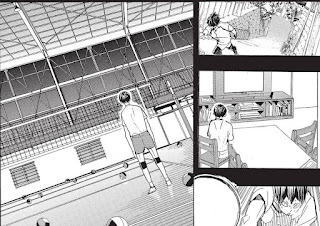A Rivalry Beyond Talent
We could call Oikawa the best setter in the prefecture.
We could say he brings out the best in his team.
We could even call him the ideal setter everyone longs for.
But in Oikawa’s eyes, he would—and will always—be wary of Tobio.
He will always believe that one day, Tobio will surpass him.
Simply because we don’t see what Oikawa sees.
We could say Tobio has surpassed every setter he has faced.
We could call his hands magic.
We could say he is a genius—the King of the Court.
But in Tobio’s eyes, he would—and will always—be wary of Oikawa.
Because in his mind, Oikawa is still ahead.
Simply because we don’t see what Tobio sees.
Oikawa’s Perspective
Oikawa has always known that Tobio’s setting skill surpasses his own. Yet, this realization does not unsettle him. Volleyball is not a game won by individual brilliance alone—it is a team sport, where synergy, communication, and strategy hold just as much weight as raw skill. Oikawa understands this better than most.
To someone like Oikawa, players like Tobio possess an analytical edge—the ability to see possibilities that others might overlook.
He saw this firsthand during Tobio’s final match at Kitagawa Daiichi—the moment that led to Tobio’s downfall. Alongside Iwaizumi, Oikawa watched as Tobio’s exceptional vision clashed with his inability to lead.
 |
| Oikawa witnessed Tobio's downfall |
But Oikawa saw more than just an overbearing setter. He noticed that Tobio recognized Kindaichi’s potential for a broad attack. He saw that Tobio understood Kunimi’s capability to move for the ball—more than just conserving stamina, Kunimi could do so much more.
 |
| Tobio knew Kindaichi's broad attack potential |
 |
| Tobio knew Kunimi's potential |
Oikawa knew that Tobio had the vision to unlock their potential, but his inability to connect with them held him back.
Despite knowing that Tobio struggles with communication, this knowledge does not bring Oikawa comfort. Because Oikawa is certain—once Tobio overcomes his mental hurdles, once he fully learns how to bring out the best in his teammates—he will stand on the same level as Oikawa. And if Tobio continues at his current pace, he will surpass Oikawa in the blink of an eye.
Kageyama’s Perspective
People call Tobio a genius. They praise his accuracy, his technique, his King Toss. But what is the use of a perfect toss if the spiker will not spike it?
For someone like Tobio, players like Oikawa have an invaluable gift—communication. The ability to inspire, to guide, to make others follow their lead effortlessly.
Tobio saw this during the first and second Seijoh vs. Karasuno match. He watched as Oikawa executed Kindaichi’s broad attack—the very same attack that had been designed for Kindaichi to use back in middle school. He saw how Oikawa pushed Kunimi to move for the ball—something Tobio had wanted Kunimi to do, but no matter how hard he tried, Kunimi wouldn’t listen.
 |
| Oikawa executed Kindaichi's broad attack |
 |
| Oikawa was able to push Kunimi |
Tobio realized that Oikawa can unify a team in a way that feels as natural as breathing.
 |
| Oikawa can unite the team |
Even though people recognize and admire Tobio’s skillset, it does not put him at ease. Because he knows—no matter how much he improves his communication, no matter how well he learns to express himself—it will never match Oikawa’s ability to command a team. Oikawa will always be ahead in this regard, simply because he was born with this innate charisma.
Conclusion: A Battle of Insecurities
Their insecurities are not just about volleyball. They are deeply human struggles.
Psychologically, extroverts like Oikawa may feel insecure when compared to introverts, fearing that they lack introspection, depth, or observation skills.
Meanwhile, introverts like Tobio may feel insecure about their perceived lack of social skills, struggling with group interactions in ways that extroverts find effortless.
 |
| Strengths and Weaknesses |
In short conclusion, Oikawa and Iwaizumi believe Kageyama is a volleyball prodigy. But what they don’t realize is that Kageyama didn’t just wake up as a genius—he’s been playing since he was a toddler. By the time he joined his middle school club, he was already skilled enough to be seen as a prodigy.
 |
| Manga Chapter 387 |
On the other hand, Kageyama never had real friends. Volleyball was his entire world, leaving him blind to social cues. That’s why Oikawa’s extroverted leadership both amazed and intimidated him.
 |
| Manga Chapter 387 |
In the end, both Oikawa and Tobio bring out the best in their teams, but through different means.
- Oikawa leads through communication. His outgoing nature draws attention, allowing him to guide his team with energy and charisma. His presence makes people listen, follow, and trust him.


- Tobio leads through trust. His unwavering focus, intensity, and precise play force his teammates to rise to the challenge, even if he does not vocalize it. His presence pushes them to give their all.




Both are exceptional. Both are vital. And both are constantly learning from each other—pushing one another to new heights.
Final Notes:
- Extroverts can still develop deep observation skills. With training, they can refine this ability.
- Introverts can also lead teams. With maturity, they can develop leadership in their own unique way.
- Both Oikawa and Kageyama have grown past their insecurities—but they will always be cautious of each other.




No comments:
Post a Comment